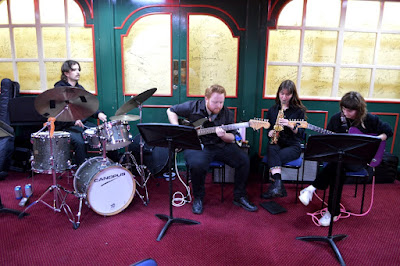It was pretty sophisticated popular music but I'll dub it Hot pop anyway because it was fun to hear and no doubt fun to play. This was Elise leading on a range of sophisticated modern musics with a few visitors from north of Sydney and a few hot locals. The visitors were Toby Hall and Pete Grey. Toby has come to town for various jazz gigs in the past although I haven't caught him recently. He was all pushing and playful and drawing all from Elise and the band. Pete was new to me, playing a very sweet and inventive gig on a red JB, slinky and fingered and nicely busy and just one little slap line. The locals were Matt Lustri, local guitar whiz, now also singing harmony and one front line as Matt "Bianco" Lustri. I like his calm but explosive and well effected guitar, although this was more subdued than I've seen him before, given the more poppy material. I admire singers and Matt singing was new to me. Ross Buchanan is a common sight around town and this blow-out performance just confirmed why: busy, charging, unrelenting, staccatos or extended phrases on piano and organ. I loved to see Pete's glances of interest following a few particularly driving fast repeating staccatos. It worked a treat. And Elise, leading on vocals, friendly in presence and with flute melodies and solos to add to the sounds, and with a fabulous repertoire of interesting tunes, a few new to me and worthy of investigation, and danceable beats. Noel Gallagher, Matt Bianco, Derek Trucks to Bowie Life on Mars and Prince Diamonds and pearls and even Gil Scott-Heron Lady Day and John Coltrane. And some blues and latin and always driving groove with just a touch of the quieter. Great fun, tapping toes and some new and reappraised works of genius.
Bella Groove appeared at Smiths featuring Elise Walsh (vocals, flute), Matt Lustri (guitar, vocals), Ross Buchanan (keys), Pete Gray (bass) and Toby Hall (drums).


































